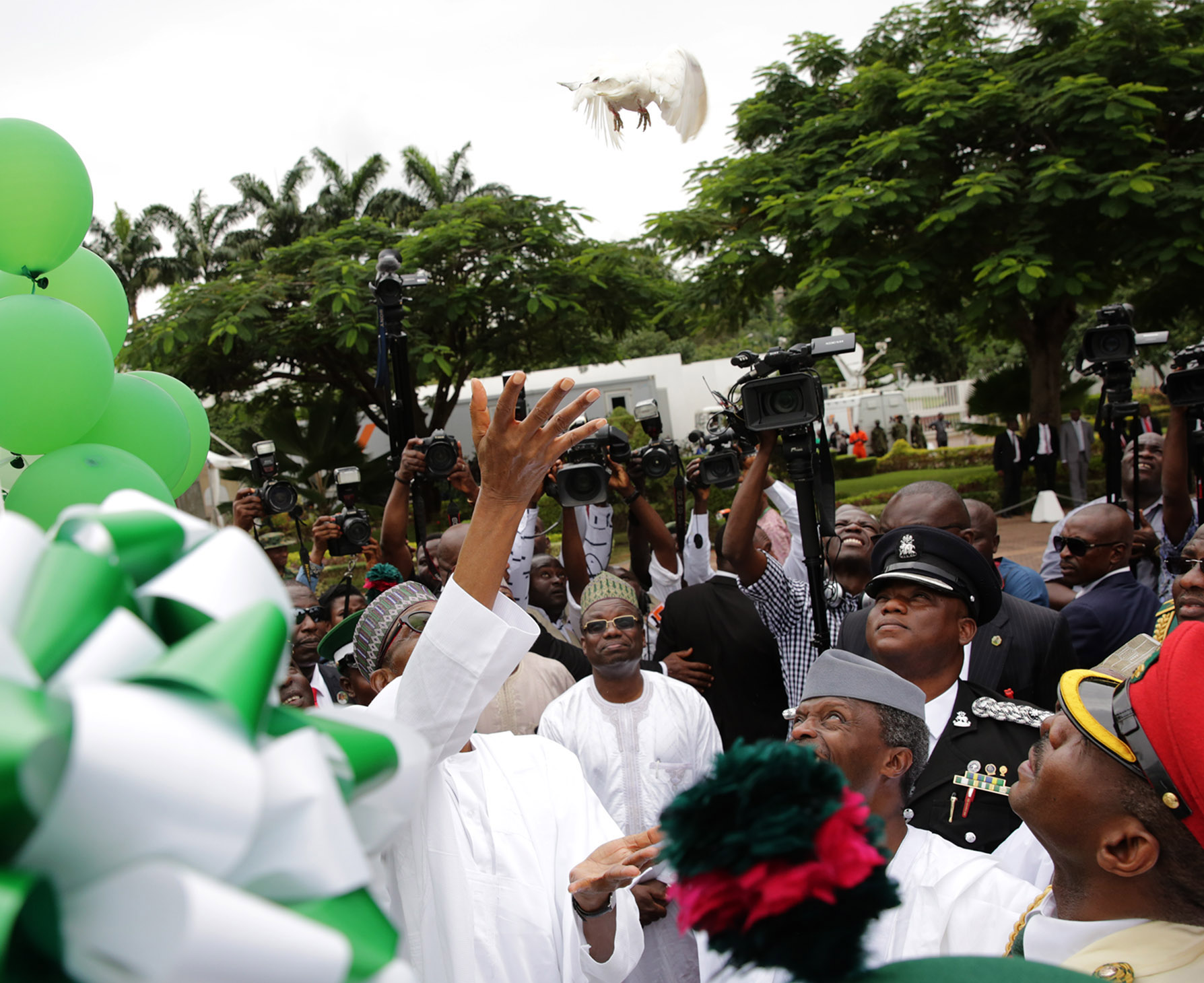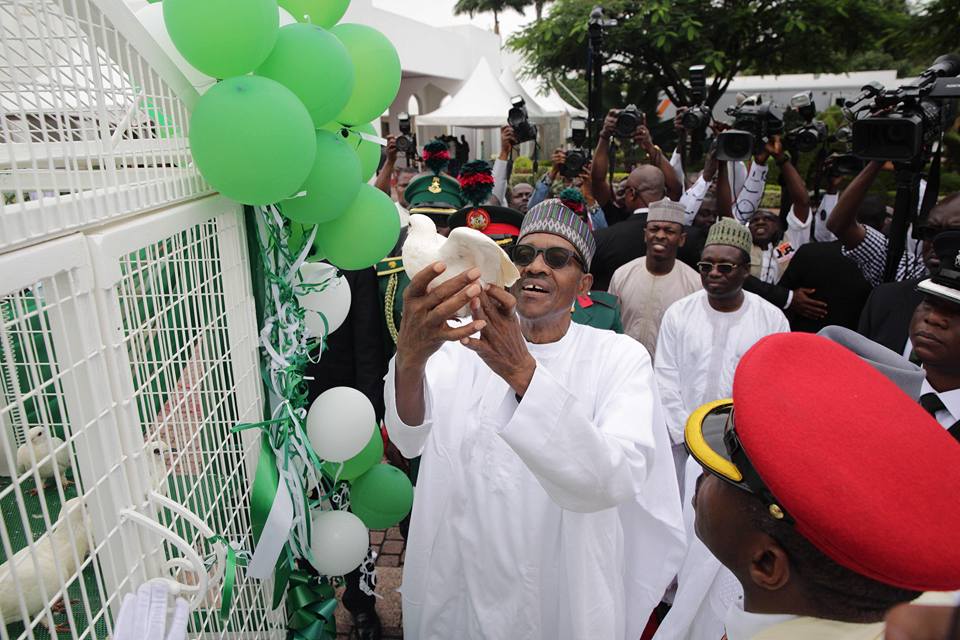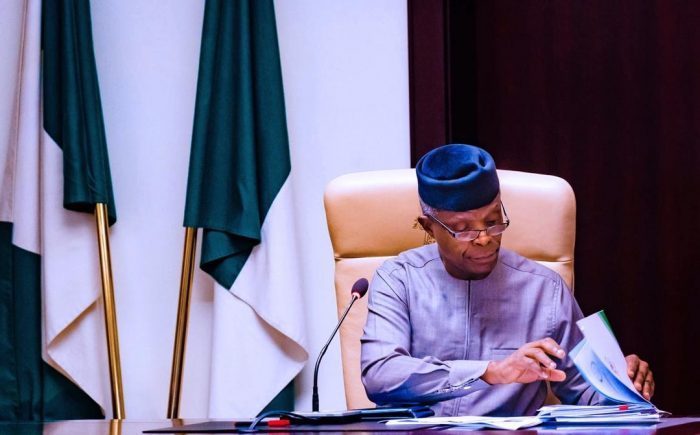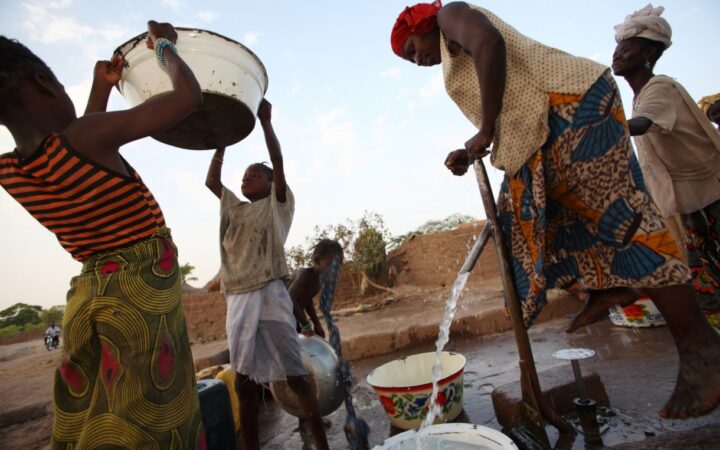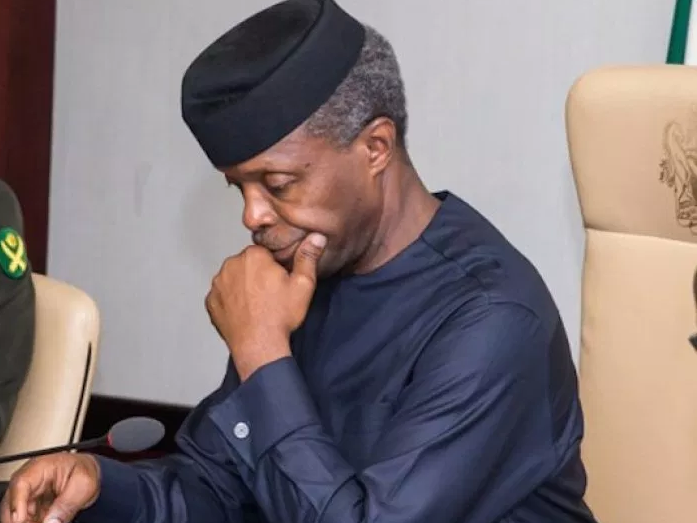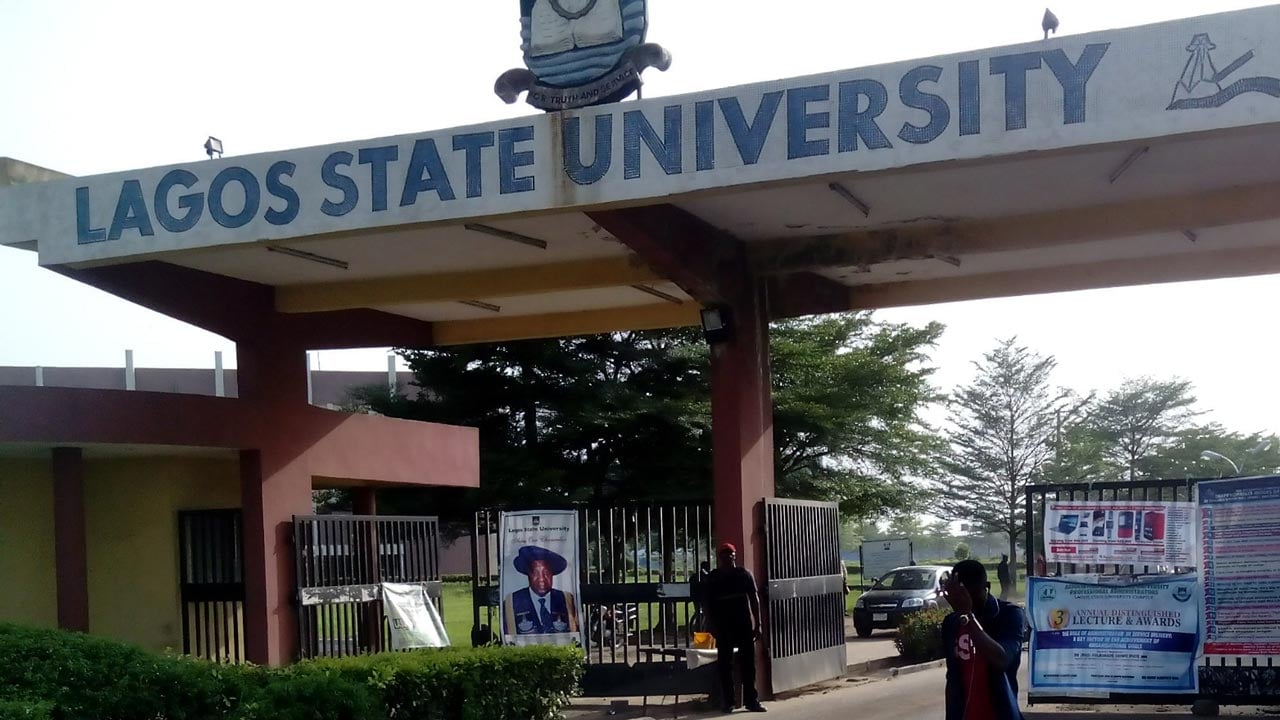President Muhammadu Buhari releases the pigeons flanked by the Vice President Prof Yemi Osinbajo during the 56th Independence Annivesary at the Presidential villa State House Abuja
BY FRANCIS ANEKWE OBORJI
This year, October 1, 2019, Nigeria marks fifty-nine Years of its political Independence from Great Britain. As significant as this event and day is for the nation, we should not fail to ponder a while, ask the fundamental question, about the inability of Nigeria as a nation state to rise above its pre-independence, and immediate post-independence shenanigans?
‘How did we as a nation state arrive at this point?’ That is, ‘instead of moving forward and translating into a modern democratic and progressive nation state, the country seems to be sliding everyday into a near-medieval feudal state and hopelessness for many of its citizens.’
For instance, security of lives and property as well as welfare of the citizens – basic functions of a state, have fallen to the barest minimum possible in the last five years alone in Nigeria. Today, majority of Nigerian citizens appeared getting disillusioned with each passing day, with the happenings in the country’s political landscape. All indices of a developing nation in progress, as far as Nigerian state is concerned, today, point to the contrary.
Advertisement
What actually, is the problem with Nigeria?
Authors such as Chinua Achebe have said that the “Trouble with Nigeria” is purely and squarely the failure of ‘leadership.’ However, in as much as I concur with Achebe’s assertion, one question remains unanswered: “How come it that after 59 years of political independence, Nigeria has not been able to fix its leadership problem and other lapses? Whence lies the Nigerian problem?
All these constitute the point of departure for our present article, dedicated to Nigeria’s 59th Independence Day Anniversary, October 1, 2019. For sake of brevity, we shall concentrate on just one point, namely: The Particularity of the Problem with Nigeria!
Advertisement
THE PARTICULARITY OF NIGERIAN PROBLEM
In discussing this topic, we would like to review the “Memorandum” published during Nigeria-Biafra War (1967-1970) by American Jewish Congress (New York, on December 15, 1968). I found the “Memorandum”, the best analysis so far, from a historical point of view, on the subject of our article.
The “Memorandum” (which can be accessed Online), discusses the conflicting value systems of Nigeria’s three-major ethnic-groups and others. It contains useful information about the intrigues behind Nigeria’s founding story, the pre-independence and post-independence conflicts, detailing in particular, the reasons behind the Nigeria-Biafra War – the underpinning historical reality, which gave rise to the present political conflict and instability of the country.
The ‘Memorandum” was directed by Phil Baum (Director of “Commission on International Affairs” of American Jewish Congress. It has 15 subsections divided into 5 main chapters. However, our interest is where the Memorandum discussed the topic, titled: “Indigenous Differences among the Peoples of Nigeria.” Here the memorandum began by saying that:
Advertisement
“More than fifty years ago, Great Britain artificially carved an area out of West Africa containing hundreds of different groups and arbitrarily unified it, calling it Nigeria. Although the area contained many different groups, three were predominant: the Hausa-Fulani, which formed 65% of the peoples in the northern part of the territory; the Yoruba, which formed about 75% of the population in the southwestern part; and the Igbo, which formed between 60-65% of the population in the southeast.”
The Memorandum goes further to say that, “Each of these groups was so distinctive politically, religiously, culturally, and socially, as to constitute what Europe in most circumstances would be thought of as a separate nation. “The profound differences between them account, in a large sense, for the disintegration of the Nigerian Federation during the past several years.”
Furthermore, the Memorandum takes time to explain the differences of traditional governance structures and value systems of the three major ethnic groups in Nigeria: “The semi-feudal and Islamic Hausa-Fulani in the North were traditionally ruled by an autocratic, conservative Islamic hierarchy, consisting of some thirty-odd Emirs who, in turn, owed their allegiance to a supreme Sultan. This Sultan was regarded as the source of all political power and religious authority.”
With regard to the Yoruba political system in the southwest, the authors of the Memorandum also said that “like that of the Hausa-Fulani, also consisted of a series of monarchs. The Yoruba monarchs, however, were less autocratic than those in the North, and the political and social system of the Yoruba accordingly allowed for greater upward mobility based on acquired rather than inherited wealth and title.”
Advertisement
However, for the authors of the Memorandum, “the Igbo in the southeast, in contrast to the two other groups, lived in some six hundred autonomous, democratically-organized villages. Decisions among the Igbo were made by a general assembly in which every man could participate.”
The Memorandum adds that the different systems among these three peoples produced highly divergent sets of customs and values. The Hausa-Fulani commoners, having contact with the political system only through their village head who was designated by the Emir or one of his subordinates, did not view political leaders as amenable to influence. Political decisions were to be obeyed without question. “This highly centralized and authoritarian political system elevated to positions of leadership persons willing to be subservient and loyal to superiors – the same virtues required by Islam for eternal salvation. One of the chief functions of the traditional political system was to maintain the Islamic religion. Hostility to economic and social innovation was therefore deeply rooted.”
Advertisement
In contrast to the Hausa-Fulani, the Igbo often participated directly in the decisions which affected their lives. They had a lively awareness of the political system and regarded it as an instrument for achieving their own personal goals. Status was acquired through the ability to arbitrate disputes that might arise in the village, and through acquiring rather than inheriting wealth. With their emphasis upon achievement, individual choice, and democratic decision-making, the challenges of modernization for the Igbos entailed responding to new opportunities in traditional ways.
For the Hausa-Fulani, however, modernization required and still does, a complete change in values and ways of life. The Yoruba were somewhere between the Hausa-Fulani and the Igbos regarding their need for achievement and emphasis upon individual choice.
Advertisement
COLONIAL AND POST-COLONIAL INTRIGUES
The “Memorandum” goes further to show how these tradition-derived differences were perpetrated and, perhaps, even enhanced by the British system of colonial rule in Nigeria. In the North, the British found it convenient to rule indirectly through the Emirs, thus perpetuating rather than changing the indigenous authoritarian political system. As a concomitant of this system, Christian missionaries were excluded from the North, and the area thus remained virtually closed to Western education and influence.
Advertisement
In the South, and particularly in the Yoruba areas, the British were able to establish themselves more firmly and Christian missionaries rapidly introduced Western forms of education. Consequently, the Yoruba were the first group in Nigeria to become significantly modernized and they provided the first African civil servants, doctors, lawyers, and other technicians and professionals.
In the Igbo areas, missionaries were introduced at a later date because of British difficulty in establishing firm control over the highly autonomous Igbo villages (Audrey Chapman, “Civil War in Nigeria”, Midstream, Feb 1968). However, the Igbo people, highly enterprising and achievement-oriented, took to Western education zealously. By the 1940s, they had transformed themselves into one of the most educated, wealthiest, and politically unified groups in Nigeria and presented a serious challenge to Yoruba predominance in the civil service and the professions.
Moreover, with an intense desire for economic improvement, thousands of Igbos migrated to other parts of Nigeria in search of work and for trade and commerce. Many went to the Northern areas where their entrepreneurial and technical skills were in particular demand among the traditional and generally uneducated population. There they took up positions as merchants, government civil servants, and clerks in private European companies.
In time, the “Igbos came to occupy in Nigeria a position somewhat analogous to that of the Indians in East Africa or the Jews in Eastern Europe. In the North and to a lesser extent in the West they came to be looked upon as alien outsiders occupying positions in the economy that “rightfully” belonged to tile indigenous inhabitants of the area. They were perceived as aggressive and pushy, and were envied and resented because of the rapidity with which they acquired education and wealth.”
In fact, for the authors of the “Memorandum”, the political division of Nigeria during the colonial period into three regions – North, West and East – exacerbated the already well-developed economic, political, and social competition among Nigeria’s different ethnic groups. For the country was divided in such a way that the North had slightly more population than the other two regions combined. On this basis, the Northern Region was allocated a majority of the seats in the Federal Legislature established by the colonial authorities.
Within each of the three regions, the dominant ethnic groups – the Hausa-Fulani, Yoruba, and Igbo respectively – formed political parties that were largely regional and tribal in character:
“During the 1940’s and 1950’s the Igbo and Yoruba political parties were in the forefront of the fight for independence from Britain. They also wanted an independent Nigeria to be organized into several small states so that the conservative and backward North could not dominate the country. Northern leaders, however, fearful that independence would mean political and economic domination by the more Westernized elites in the South, preferred the perpetuation of British rule. As a condition for accepting independence, they demanded that the country continue to be divided into three regions with the North having a clear majority. Igbo and Yoruba leaders, anxious to obtain an independent country at all cost, accepted the Northern demands.”
Nigeria finally achieved independence in October 1960 and appeared, for a while to have a bright political and economic future. When no one party received a majority in the pre-independence elections, a Northern-Eastern coalition was formed which afforded the country political stability. This stability, however, was short-lived.
The Memorandum gave the following as reasons for the short-lived First-Republic: “Within a few years, explosive forces always present covertly, began to surface. Since 1962, Nigeria has been rocked by widespread violence, internal disorder, and now by a savage civil war. This violence reflects, in essence, Northern attempts to maintain control of the country in the face of increasingly intense opposition from the South and particularly the Igbo peoples.”
The Memorandum goes further to say, “Within a period of three years – from 1962-1965 – the Northern-dominated Federal Government instigated a split in the Yoruba party which rendered the Action Group virtually ineffective; invalidated a nation-wide census which reportedly showed the two Southern regions to have outstripped the North; and blatantly rigged two elections in order to perpetuate their control of the control and the Western Region which they gained after rendering the Action Group ineffective.”
Continuing, the Memorandum says: “The split of the Yoruba-based party was instigated by the North because its leaders, Chief Obafemi Awolowo, favored unremitting struggle against the Northern-dominated Government under the banner of ‘African “Socialism.” He also made strenuous efforts to attract to his party minorities and other disaffected groups in the Northern and Eastern Regions, thus violating the tacit agreement to respect existing spheres of influence Thereafter, the Federal government moved more decisively to consolidate its strength. Claiming to have uncovered a plan for a military coup, the Northern-dominated Federal government arrested Awolowo and sentenced him to ten years in prison.”
At any rate, having arbitrarily invalidated the 1962 census, the Northern-dominated Federal government conducted a new census the result of which were predictably favorable to Northern interest. They were announced in early 1964: North, 29.7 million; East 12.3 million; West 10.2 million; Mid-West, 2.5 million (this region was newly created in 1963); and the Federal Territory of Lagos, 675.000.
“The new census in turn was challenged by the Igbos as rigged and inaccurate and shattered the Eastern-Northern coalition which until then had managed to maintain some semblance of political stability in the country.” This bitter controversy stimulated a rearrangement of political forces in Nigeria. By 1964, only four years after independence, the country was largely split along North-South, conservative-progressive lines.
The national elections of December 1964, in which these coalitions were to meet for the first time, was, perhaps, the immediate cause of Nigeria’s disintegration. Basically, it was alleged that the party representing Southern elements was not allowed to compete in the North and the Northern-controlled Western region. According to one report, ‘4,000 of its members were arrested including 40 nominees for the Federal Parliaments. The party thereupon demanded a postponement of the elections and a thorough investigation. Prime Minister Balewa, a Northern Muslim, refused. The party then responded with a boycott of the elections and an announcement that it would not recognize any government based upon its results. Consequently, only 20% of the electorate participated in the 1964 vote as opposed to 80% in 1959.’
In effect, a large segment of the people had withdrawn legitimacy from the government. Nigerian unity appeared to have been shattered. Only intensive negotiations between Federal and regional leaders leading to agreement on a “broadly-based” government averted a crisis – however temporarily. The underlying problem of sectionalism, corruption and illegal practices remained.
The following year elections were again rigged, this time in the Western Region. Thousands of illegal ballots were found in the possession of government officials. “Impartial observers widely agreed that the election returns were falsified to give the Northern-controlled party an overwhelming victory, but one completely lacking in credibility.” This time widespread violence followed. Prime Minister Balewa, instead of responding to appeals for a new election to be supervised by the army rather than Western Government-appointed officials, ordered the army to restore law and order.”
All this implies that the idea of a democratic Nigeria had proven to be a myth. Vast numbers of people were disenchanted with results of independence and the widespread corruption among politicians. Elements among the South, the students, the southern intelligentsia, and the army officer corps were particularly disaffected:
In January 1966 a number of young army officers (majority of whom Igbos, and officers from other major ethnic-groups (North and West) – attempted to overthrow the Federal Government. In the process they killed Prime Minister Balewa, Northern Premier Sir: Ahmadu Bello (also the Sarduna of Sokoto – Islam’s highest religious leader in Nigeria), and a number of Northern army officers. “Maj. Gen. Johnson Aguiyi-Ironsi – also an Igbo, was invited to head a provisional military government. Ironsi, reluctantly “accepted” … and two days later the leader of the coup, Major Chukwuma Nezogwu pledged his loyalty to Ironsi, provided there would be no reprisals against him and his followers.”
The January coup and the Ironsi take-over were widely supported throughout Nigeria by youth groups, trade unions, businessmen, and even some Northerners. Most young and progressive elements hoped and expected that the new government would stop corruption and would institute those reforms necessary to unify the country and organize its economy on terms of national rather than regional needs.
At the outset, General Ironsi faced “a major dilemma. Could he and should he punish the instigators of the coup for assassinating the Federal Prime Minister, and Premiers of Western and Northern Regions? He had to bear in mind especially that the latter had been Islam’s revered religious leader and was generally acknowledged to be the power behind the Prime Minister himself. The Northern rank-and-file of the army were bitterly resentful over these murders, as well as the death of many Northern officers.”
However, “if Ironsi punished the young officers who had staged the coup, he would probably alienate the Igbo officers who formed about one-third of his officer corps, plus the whole southern intelligentsia who were fed up with the conservative, Northern-dominated and corrupt Federal Government.”
Ironsi chose instead to attempt to heal the rifts in the army and country by instituting badly needed reforms. In May 1966, as part of this program, he abolished the Federal structure of government. But this proved his undoing.
“Many politicians and bureaucrats with vested interests in a Nigeria divided into regions vigorously opposed this move. They chose to see it as a bad attempt to consolidate Nigeria under Igbo domination. To support their suspicions, they pointed to the fact that almost all the officers who staged the coup leading to Ironsi government were Igbos. Further, the politicians and officers killed in the coup were almost all from the North and West, while Igbo officials were left untouched.”
Thus, following the Ironsi take-over, “ousted Hausa-Fulani bureaucrats, politicians and religious leaders, began to focus upon Igbos living in the North as responsible for all the problems that were beginning to face the North – from rising prices to the declining power of the Northern Region in the Federal Government. Two days after the Ironsi proclamation of a unified governmental structure, these elements organized riots in several Northern cities resulting in the deaths of hundreds of Igbos and the forced exodus of thousands of others. This massacre fed upon the long-standing resentment of Igbos based upon their rapid accumulation of wealth and education.”
The idea of an Igbo take-over of the country gradually gained more and more credence and led to further unrest in an already disgruntled army: “On July 29, 1966 Northern soldiers staged counter-coup, killing Ironsi, and about 400 Igbo officers. Colonel Yakubu Gowon, announced as new head of the government, immediately restored the federal structure yielding to the demands of the Northern politicians. Now, the high hopes of reconstruction and modernization after the Ironsi coup were suddenly dashed by a counter-coup scarcely half a year later.
The aftermaths of it all, were the frustrations, especially, in Northern Nigeria, which transformed into deep hatred and fear by the ruthless slaughter of Igbos in the North and of Igbo officers in the army:
“As a result, many Igbos fled to the Eastern Region convinced that only secession would afford them security as well as opportunity to develop a politically coherent and economically vibrant nation… After a veritable pogrom erupted in the North in September 1966, resulting in the slaughter of more than 30,000 Igbos and other Easterners.”
This “mass slaughter left a deep scar on the Igbo people. Igbo leaders called for the return of all Igbos to their ancestral homeland and began serious preparations for secession. A January 1967 conference of leaders from all regions failed to produce lasting agreement on decentralization of the country.”
Faced with virtual secession, and strong pressure from Great Britain, Colonel Gowon reneged on the “true fiscal federalism” and regional autonomy that was reached at Aburi (Ghana) Conference by the two warring parties. Such that on return from the Aburi Conference, Colonel Gowon instead of implementing the agreement reached there, chose to respond to the crisis by dissolving completely what was left of the existing regional structure.” He created 12 states, in which the Northern region was broken into six states, the East into three, the West into two.
The new states coincided, to a large extent, with natural ethnic divisions. “Notably, the East was divided in such a way that oil reserves would be located in states without Igbo majority. … Though the Igbo elites may have been satisfied with such a proposal a year or so before, they now felt that nothing short of a loose association of sovereign states could assuage their fears. On May 30, 1967, therefore, the Eastern Region proclaimed its independence as the Republic of Biafra.”
The rest is now history. Although, the war officially, was announced to have ended on January 1970, with the paper declaration “No victor no Vanquished”, however, the conditions that led to it are yet to be addressed. Moreover, since after the war serious efforts are yet to be made by successive Nigerian federal governments towards healing the wounds of the war victims, and addressing the key problems that led to the war in the first place.
These are parts of the reasons for the present political impasse in the country!
THE CHALLENGE AHEAD
As one author rightly said: “All our leaders from 1960s cannot be bad year after year, era after era…” There is nothing wrong with our leaders. They are not fake or adulterated leaders. We simply have a ‘faulty foundation and a faulty structure that makes every action taken by a leader, favors one side, while antagonizing the other. The faulty foundation and structure of Nigeria is the problem with the country.’
Again, it needs be said, ‘Corruption is not our fundamental problem as many wrongly have interpreted Nigeria’s problem.’ No. The real problem with Nigeria is not corruption; “something is fuelling that corruption. Tribalism is not our main problem; something is fuelling that tribalism. Religious intolerance is not the basic problem; something is fuelling that religious intolerance. It is also not hate, or envy or anger; something is fuelling the hate, or envy or anger.”
In other words, as a nation state, Nigeria has a faulty foundation, and a faulty structure that makes the parts to be perpetually seeing one another as rivals and enemies bent on taking everything. As our history as a nation state has shown, our political leaders dance to the tune of such a music of a dysfunctional foundation and faulty structure. They embraced it religiously, live and abide by it.
The federal government use military intimidation, brutality and recklessness against the citizens or against the dissenting ethnic-group to bully the people into living under such an unjust situation and political system. This is why regime after regime, elections after elections, we are always back to ‘square-one’ – to the valleys of darkness and lamentation as a nation state.
This is in spite of who emerges as a leader – no matter how or from where such a leader emerges. The problem with Nigeria has remained stagnant and malignant. In other words, like malignant cancer, Nigeria needs a clinical surgical operation that could remove the “tumor” to cure the cancer patient.
This is the trouble with Nigeria! If nothing is done about it, we will be searching till thy kingdom come, for the messiah that will never come.
What all this boils down to is that ‘Nigeria needs to return to the drawing-board. It needs to go back to the ‘re-negotiating-table.’ We must be allowed to ‘re-negotiate’ the type of country or nation-state we want as a people. Because what we have today in Nigeria as a nation-state, after many years of experimentation, is not working. We should stop deceiving ourselves. ‘Playing god’ to do the impossible in Nigeria can’t help anybody!
This is time to give various federating units in the country, the opportunity to decide what kind of nation and government structure they want for themselves and the nation. Any federating unit that harbors some fears about what majority might have proposed, should, as a matter of urgency be persuaded, not forced. Where there is a great opposition backed with strong reasons, people of that federating unit should be allowed to choose the type of governance structure they want for themselves. This is how things are done in most civilized countries, that have similar situation such as ours – a country of multi-ethnic and multi-religious configurations.
This is very important considering the fact that the political division of Nigeria since colonial era, into regions (and later into states under the present unitary system of government), followed the ethno-religious cultural divisions. For the country was divided in such a way that the North had slightly more population than all the regions (or states) in the South combined. On this basis, the Northern Region always had a majority of the seats in the Federal Legislature established by the colonial authorities and subsequent post-independent constitutions.
This created the situation for the present-day cry of marginalization by the most short-changed ethnic groups in Southern and Middle Belt parts of the country. It has also resulted in giving the country, a ‘notoriously lopsided’ government at the federal level.
Moreover, within each of the old three major regions from independence, the dominant ethnic groups – the Hausa-Fulani, Yoruba, and Igbo respectively – their political parties are largely regional and tribal in character. Since democracy is a game of numbers, where the number of seats you have in the Parliament determines everything, only the region, ab initio, organically structured to control the majority seats at the federal Parliament, will continue to lord it over other short-changed ethnic-groups. This is the political situation in Nigeria today, as presently structured.
This situation has continued to exacerbate the mutual hostilities and infighting among the three major different ethnic-groups. It has continued as well to undermine the modernization of their respective already well-developed economic, political, and social ways of life. The ugly situation had, in fact turned, what could have been a healthier competition among neighbors – Nigeria’s different ethnic groups, into resentment, hatred, envy, and suspicion of one another as enemies and permanent rivalries.
CONCLUSION
Continued silence of people of good conscience on the deteriorating Nigerian political situation will do nobody any good. Fifty-nine years after political independence from Britain, in the eye of many people, Nigeria as a nation state is not working. This is in spite of how we may pretend to cover it, or present deceptive picture of the country to ordinary people or outside world.
It is high time we tell ourselves the ‘naked truth’ about the dark cloud hovering over our dear nation Nigeria. This we do, with the aim to save the nation, and people of its diverse federating units.
It is a challenge to all those at the corridors of power and all enlightened Nigerian citizens, as well as our foreign friends and international community. We should not wait until it is too late before something tangible is done to save the situation on the ground today in Nigeria.
A stitch in time saves nine!
Views expressed by contributors are strictly personal and not of TheCable.
Add a comment
